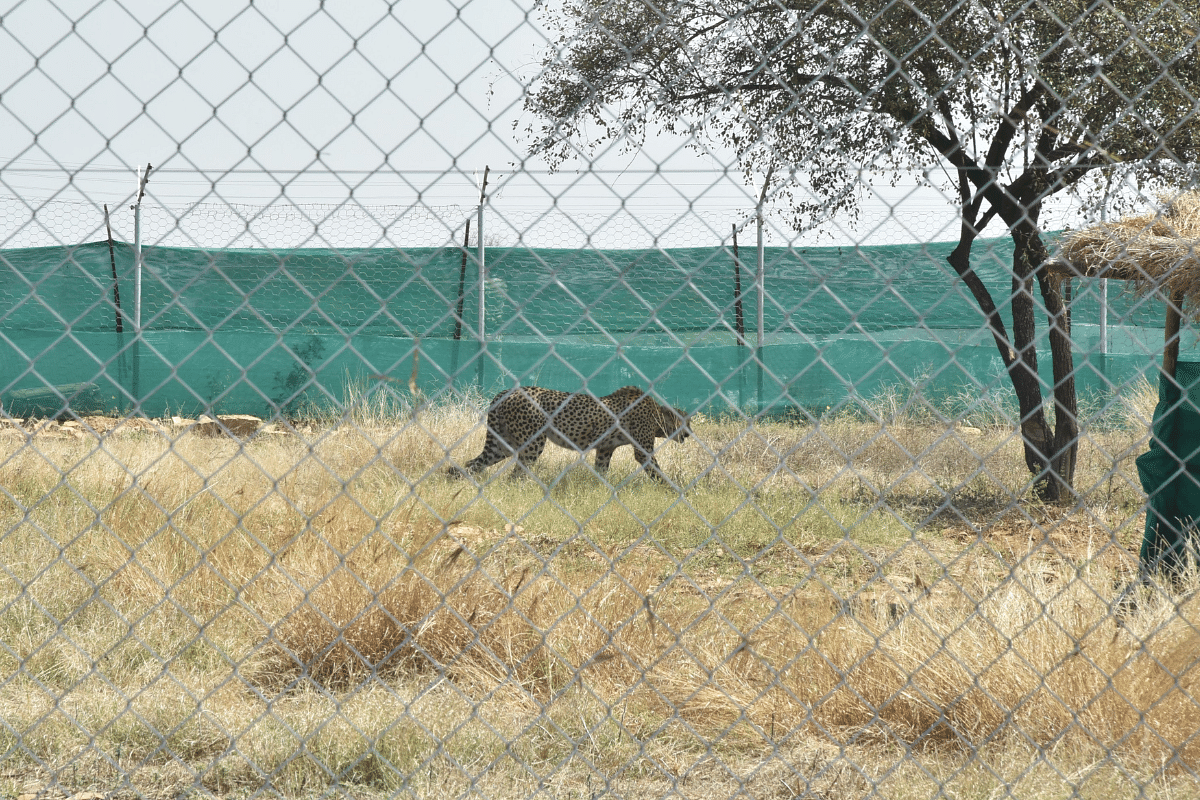Science
From South Africa To India, A Change Of Home For 12 Cheetahs Takes Kuno And India’s Cheetah Tally To 20
- India is moving along nicely in its ambitious plan to bring cheetahs back to the Indian soil.
- The plan over the next five years is to introduce 50 cheetahs in national parks.

One of 12 South African cheetahs released into Kuno National Park. (Photo: Bhupender Yadav/Twitter)
Twelve cheetahs from Johannesburg, South Africa, had a rather significant change of address after they were released into Madhya Pradesh’s Kuno National Park on 18 February.
It was quite a journey too, at over 7,900 kilometres.
They flew for 10 hours on an Indian Air Force C-17 aircraft from South Africa and landed at the Air Force station in Gwalior.
They took off again for a brief ride in three Mi-17 helicopters before being resettled in Kuno.
This is the second batch of cheetahs reintroduced in India. In the first round of reintroduction, eight cheetahs were flown in from Namibia and released at Kuno in September last year.
That had marked the return of the cheetah to Indian soil in a long time.
Cheetahs went extinct in India after the last one died in present-day Chhattisgarh (then Madhya Pradesh) in the year 1947. Overhunting and habitat loss were identified as the causes. The species was declared extinct in India in 1952.
Bring Back Cheetahs
Two decades later, the Government of India was keen to reintroduce cheetahs in India. They wrote to Iran in the 1970s asking for Asiatic cheetahs and Iran responded favourably. But that was that.
Decades later came Project Cheetah.
Project Cheetah of the Government of India aims to re-establish the species in its historical range in India. It is the world's first intercontinental large wild carnivore translocation project.
Conversations around cheetah reintroduction were initiated by the Wildlife Trust of India in 2009. Site surveys were carried out thereafter to explore the suitability and logistics of reintroduction.
Former cheetah range states Gujarat, Rajasthan, Chhattisgarh, and Madhya Pradesh were naturally high up in the pecking order. Among the 10 sites surveyed in these states, Madhya Pradesh's Kuno National Park won the top honour.
The 748-square-kilometre national park forms part of the Sheopur-Shivpuri deciduous open forest landscape. It is devoid of human settlements, after all the villages inside the park were relocated. The park is estimated to be able to sustain 21 cheetahs.
Larger Plan
Now that 12 cheetahs have joined the eight reintroduced last year, the larger plan is to have 12 cheetahs coming in every year for the next eight to 10 years.
Over the relatively shorter term of five years, a total of 50 cheetahs is planned to be introduced in national parks.
Besides Kuno, other cheetah home options in India are the Nauradehi Wildlife Sanctuary and Gandhi Sagar Wildlife Sanctuary (the Bhainsrorgarh Wildlife Sanctuary complex) in Madhya Pradesh and the Shahgarh bulge (Jaisalmer) and Mukundara Tiger Reserve in Rajasthan.
Cheetah Choice
India has thus far picked cheetahs from southern Africa. The Ministry of Environment, Forest and Climate Change cited a couple of reasons in a note last January.
Cheetahs in this region have the maximum observed genetic diversity among extant cheetah lineages, an important attribute for a founding population stock, the note says. Plus, they are found to be ancestral to all the other cheetah lineages, including those found in Iran.
Endemic to the savannahs of Africa, the cheetah is the world’s fastest mammal. It can clock speeds up to 120 kilometres per hour.
Cheetah numbers worldwide have fallen from an estimated 15,000 adults in 1975 to a population of less than 7,000 individuals now.
The species is listed as vulnerable (Appendix I) under the Convention on International Trade in Endangered Species of Wild Fauna and Flora (CITES).
The 12 cheetahs resettled in Kuno were born in the wild and grew up among competing predators, such as the lion, leopard, hyena and wild dogs.
They were made available to India by the Phinda Game Reserve (3), Tswalu Kalahari Reserve (3), the Waterberg Biosphere (3), Kwandwe Game Reserve (2), and Mapesu Game Reserve (1).
The new cheetahs now begin month-long quarantine in separate enclosures and the like at their new residence.
Kuno is now home to 20 cheetahs, 10 male and 10 female.
Support Swarajya's 50 Ground Reports Project & Sponsor A Story
Every general election Swarajya does a 50 ground reports project.
Aimed only at serious readers and those who appreciate the nuances of political undercurrents, the project provides a sense of India's electoral landscape. As you know, these reports are produced after considerable investment of travel, time and effort on the ground.
This time too we've kicked off the project in style and have covered over 30 constituencies already. If you're someone who appreciates such work and have enjoyed our coverage please consider sponsoring a ground report for just Rs 2999 to Rs 19,999 - it goes a long way in helping us produce more quality reportage.
You can also back this project by becoming a subscriber for as little as Rs 999 - so do click on this links and choose a plan that suits you and back us.
Click below to contribute.
Latest